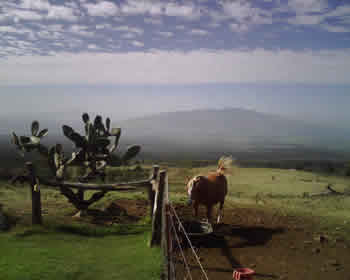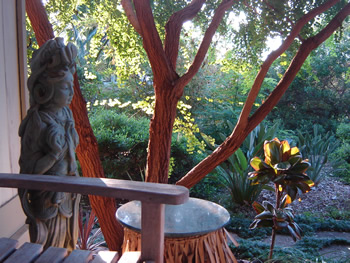 Not from the beginning; from now. This story has been told before, but is soon forgot in all the stories that come after.
Not from the beginning; from now. This story has been told before, but is soon forgot in all the stories that come after. This one, for instance, began with a shadow hunter on a candlelit ceiling. Then, a ceiling fan. Finally, a computer. And yet, there is always more after the finally is finally done. So now we come back to this story of story again.
What happens, you ask?
What comes next?
It could be over in an instant. It could be delivered by the good grace of the spirits or the Great Spirit Self of all separate selfs, known not selfishly as the Universe. Or perhaps in the naming, distinguishing, we do gain that distinction, self-ish, through self-distinguishing, the opposite of enlightenment, self-extinguishing. After all, the language is made that way. To identify, discriminate, divide and thereby conquer. The earth, that battleground of human will to grasp.
Some would say the story has ended as of this moment, 10:31 PM Hawaii time, with full lunar eclipse tonight before Solstice day. Some, that is, who interpret this event as the actual "end of the Mayan calendar," instead of the usual target of 21/12/2121. Some say that means "the end of time" - either the apocalypse version, or just a cosmic stopwatch punching out "no time." Some say it'll be just more of the same, bigbiz as usual, which means of course "apocalypse now, middle east remix." And I know one guy who would take the numbers and work out a cool djembe beat, g d P T g d g d P d g T.
So we come down to the nitty gritty: what is your story? What is mine? I'm sure we'd both rather hear about yours, so why don't you start?
While you're thinking about it, I'll just type some thoughts here on the subject of psychology. The story, the story goes, is just a story, and we can let it go, in the dark of this full moon at the dark of this year.
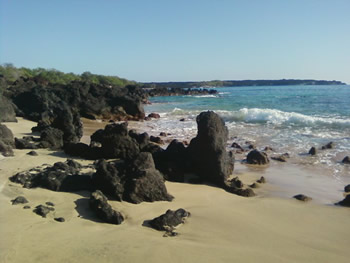 If I delve, for instance, into my own story now, it becomes a journal, and I might be inclined to nurse its tenuous existence offstage, if I don't like what I'm feeling now, shrinking from concern over how I must appear ... though Little Grandmother Kiesha Crowder and the great Abraham Maslow agree, that the first principle of self-actualized people is to have no concern for the opinions other people have about you, for those too are only stories, and not even ours. And likewise you don't judge them by your own story, but accept that they too are learning just as we all are, all faces of God, who chose to be here for this difficult learning. David Wilcock in his October Surprise radio interview echoes these sentiments in his conclusion, pointing to our higher self becoming available when we still the mind of its normal chatter, not striving however for some perfect Zen garden or abstract void, rather to create an opening for higher self to come through, to speak, to manifest.
If I delve, for instance, into my own story now, it becomes a journal, and I might be inclined to nurse its tenuous existence offstage, if I don't like what I'm feeling now, shrinking from concern over how I must appear ... though Little Grandmother Kiesha Crowder and the great Abraham Maslow agree, that the first principle of self-actualized people is to have no concern for the opinions other people have about you, for those too are only stories, and not even ours. And likewise you don't judge them by your own story, but accept that they too are learning just as we all are, all faces of God, who chose to be here for this difficult learning. David Wilcock in his October Surprise radio interview echoes these sentiments in his conclusion, pointing to our higher self becoming available when we still the mind of its normal chatter, not striving however for some perfect Zen garden or abstract void, rather to create an opening for higher self to come through, to speak, to manifest.Whether the higher self is identified with angels or demons, aliens or space sisters, God in his Darwinian beard and Charlton Heston brow, or the well-padded earth goddess herself, it comes to clear the air of the TV-grade stories, the propaganda news, gossip and hearsay, grief of the past and fear of the future, caught in the middle, reasons why, if only, she said he said, then what? Something new, imagine that. But of course, if I sound cynical, despite my highest wishes, it is because my tool is the dull hammer of the mechanical age, glyphs on virtual parchment, ants of logical construction yammering across the page as if to trace whole murals of truth.
In tonight's dance class teaching, we are called to center in the body. A couple inches below the navel, will connect us also to the earth. A center in the heart, to all beings. And in the mind, our center connects us to all parts of creation. (Note: that's natural creation, not trash, which Little Grandmother reminds us is something only we careless selfish humans create.)
The stories go on, because that is the function of language, to create stories. You might say that language is the earth, its geology, and stories are its form of life, its biology. Or to switch academic departments, linguistics studies language, literature studies stories.
It is interesting to note in today's media world how so many kinds of stories now are hybrids. Half the Maui Film Festival's offerings this winter are pegged in the brochure as "dramedy," a term I'd never heard before. Of course it's been a noticeable trend in film for a decade or more (a real film buff could nail that down for you, or perhaps a couple of minutes of my time either now or later, googling and doing a bit of research, but I'd much rather continue this conversation with you) ... But wait--I realize now my error. You were preparing your own monologue, while I pursued this other trail for the most part assuming a listener, which is to say reader, but the only one available was you, and you were busy, so the whole exercise ends up being just that, an exercise.
Now see, in the time it took me to type the above, I might have departed into that other storyline - or you might say, followed the central thread instead of digressing, yet at the time it felt like digression; so how to tell, at any given moment, which is which? - for a quick consultation of Google, and so all right, since you insist ... hummpf. The article discusses literature (19th-century drama - Chekhov, Ibsen, Shaw) and TV (1969, advent of comedy-dramas) but not film. The thread stops here, apparently.
The reference to the dramatists, however, strikes a note of connection to theme, if not storyline itself: the stance of irony. Irony is the mode, after all, of discourse when our story discusses itself, or pretends to discuss itself, or merely silently offers its opinion in the form of the clothing, the coloring, the style, the selection of story elements it chooses to present. In this light, you might call any author ironic. True, there is a mimicking of creation - no, an enactment of creation - in any, well, creation. So there is the thing itself, presented in particular definition provided by the eye of the beholder who is the author; but then the reader has your own interpretation; and the author smiles whether benignly or sarcastically, and even on occasion may have a word to say edgewise. Or even, on rarer occasion, steal the whole show, shoo out the audience, kick back and light a cigar to watch the premiere all by his Orson Welles lonesome.
Coming back to the higher self, where did it go? When last seen it was hiding in the center of the mind. Then suddenly, as if sucked into the stargate at the center of the capstan (for all you sailing buffs), it vamoosed back to the mother ship complaining, "Jeez, X98&$@f, these po mo fo's a piece a work!"
So here I put off dark-night's sleep, intending to write a serious tome or at least reverent epistle but instead manage only this garbled transcription of a shoddy demo tape of an ancient lecture on dramatic irony when really, the clearest insight to come out of it all is the wikiquip about the Greek model (and they should know, because didn't they invent language, or at least philosophy?), to the effect that all stories are about either movin' up the ladder (comedy) or down (tragedy). Now so as not to end on that sour note, I leave you with - what, a homily? A joke? No, jokes go at the beginning, to get them on your side. You don't want to end with "The joke's on you, sucker." No, you end with appreciation, and inspiration, and motivation to do that meditation, and invite that higher self in ... you see, some can preach and mean it, they can use the good word as the Bible intended, the Word of God, that can be trusted, and that alone, because it comes from the Highest Authority, and so on. In the Beginning, after all, I mean before all, was, I mean is, the Word.
So is the user of language doomed to intentional (political) or unintentional (religious) obfuscation, or exiled to the inherent irony of fiction?
The question brings us back to the hybridization, the melting pot, the unified field of film genres, of TV shows, of news and documentaries, of fiction, nonfiction, drama, journalism, theatre and politics, puppet show and circus du jour. Reality TV has been replaced by Reality Reality, where events are orchestrated and spun at the highest levels of power and influence, at the expense of truth and justice and common sense. Trouble is, common sense is out the window when the man and woman and children inside stay glued to the box, the screen, the flashing pad.
"Must we always stray into the political?" complains the bourgeois art critic. "Must you in fact use that odious word, 'bourgeois'? The word itself reeks of politics."
And so it does. Easier to disguise one's politics in fiction, I suppose. Just ask the White House Press Corpse (absent Helen Thomas).
If there is a point to all of this, it is this: Life is a story. Our life is a story, is full of stories. Our story is being written every minute - not just one but multiple plot lines, simultaneous variations on what we hoped might be a single theme. And always these pesky interruptions, keeping us from what we intended, and still intend, to do or say. So now that it comes down to saying it ...
It comes back to that vertebrate legacy, the spine. I danced tonight with backbone all curvy, until I realized how snakelike, I mean, how feminine it really was, and so changed my stride to more of the yangmaster strutting around shirtless with arms stiff and fists clenched. So my personal story on this new moon solstice end of the world, casting behind what does not serve, is about becoming a new man, dedicating this practice to my tragic good soldier fallen angel father, for his braveness in the genocidal turmoil and tarnished hopes of a generation, and with forgiveness for his weakness of spirit against the onslaught of collective karma. I was the lucky one, for his sins set me free to emerge into whatever form I might be.
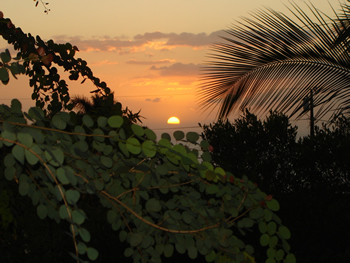
Yet still I demur. Except to stake this modest claim: storyteller (damning epithet of Dad and Mom, who warned me of the consequences, the whipping house; but hey, what do they call someone who doesn't speak at all? Dumb). So it appears, at first glance, a lose-lose proposition: Remain silent and enjoy no fully human identity; or risk falsehood in every word, every remark and opinion, every belief and claim. Ah, now we are set up for the heroic - to accept the silence and from that grounding take the risk: a mission worthy of any reader who may have just woken from his or her nap in time to catch this conclusion, before I lay me down to sleep on the longest night of the year, while the new world births.
Take the risk - we have nothing more to lose. Or everything to lose, and thus finally open to the universal energy we crave to bathe in, the larger story wanting to tell itself anew in our own voice:
Tilling soil, planting seeds, clearing weeds, tasting fruit.



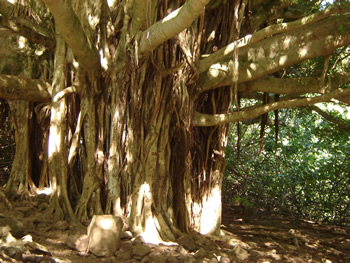 While nearly everyone comes away awed and inspired by this film, some argue that the paradigm of the Na'vi victory is not really new at all. The battle for Pandora is a rare victory for the good guys who, in a twist on tradition, are not our nation or race; but it is fought like any other, force against force. Yet the further twist here, beyond the shift in our allegiances, is telling: it is not the alien warriors or even their human supporters who win the day, but their allies, the creatures of Ehwa (Gaia). And though the mutant dinosaurs and panther-dogs do join the battle as a decisive force, the greater message is not so much that "the good fight" is won, but that the supreme force resides with the power of nature. Those who share in that power - which is also the power of greater connection as opposed to self-serving material exploitation - will ultimately prevail.
While nearly everyone comes away awed and inspired by this film, some argue that the paradigm of the Na'vi victory is not really new at all. The battle for Pandora is a rare victory for the good guys who, in a twist on tradition, are not our nation or race; but it is fought like any other, force against force. Yet the further twist here, beyond the shift in our allegiances, is telling: it is not the alien warriors or even their human supporters who win the day, but their allies, the creatures of Ehwa (Gaia). And though the mutant dinosaurs and panther-dogs do join the battle as a decisive force, the greater message is not so much that "the good fight" is won, but that the supreme force resides with the power of nature. Those who share in that power - which is also the power of greater connection as opposed to self-serving material exploitation - will ultimately prevail.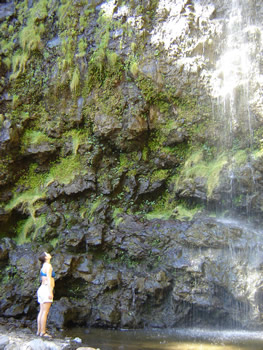 Oprah selected Eckhart Tolle's latest book for good reason: this is enlightenment for the masses. Tolle takes ancient and unversal wisdom, frees it of the dogma and terminology of past doctrines and religions, and distills it into clear, convincing, plain language. He outlines a path beyond the limited ego and its emotional "pain-body" to a new self, refreshed from habitual boundaries and definitions and ready to operate with a new frequency, new modalities.
Oprah selected Eckhart Tolle's latest book for good reason: this is enlightenment for the masses. Tolle takes ancient and unversal wisdom, frees it of the dogma and terminology of past doctrines and religions, and distills it into clear, convincing, plain language. He outlines a path beyond the limited ego and its emotional "pain-body" to a new self, refreshed from habitual boundaries and definitions and ready to operate with a new frequency, new modalities.

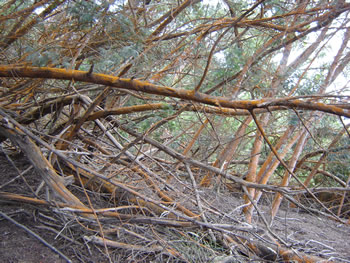

 I am vibrating now with whale frequency. I felt it ever since their darshan Thursday - their frequency of breathing, surfacing, moving out and back in through the water, their moans and grunts and cries. I rock in my sleep in bed, or in the grocery store aisles. My thoughts pass with the present time, no longer latching onto yesterday or what might come tomorrow.
I am vibrating now with whale frequency. I felt it ever since their darshan Thursday - their frequency of breathing, surfacing, moving out and back in through the water, their moans and grunts and cries. I rock in my sleep in bed, or in the grocery store aisles. My thoughts pass with the present time, no longer latching onto yesterday or what might come tomorrow. 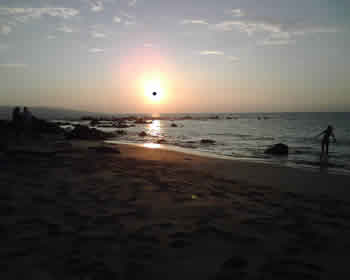 Nassim Haramein offers an inspiring synthesis of groundbreaking modern physics (beyond Einstein) and transformative vision.
Nassim Haramein offers an inspiring synthesis of groundbreaking modern physics (beyond Einstein) and transformative vision. As co-head of the whistleblower site currently drawing 30,000 unique visitors per day, Ryan is in a unique position to comment with an overview of the perspectives of the dozens of high-level sources who have come forward to share (in many cases confess) the hidden history of our times, what the official government and media and education outlets are forbidden to know or reveal.
As co-head of the whistleblower site currently drawing 30,000 unique visitors per day, Ryan is in a unique position to comment with an overview of the perspectives of the dozens of high-level sources who have come forward to share (in many cases confess) the hidden history of our times, what the official government and media and education outlets are forbidden to know or reveal. 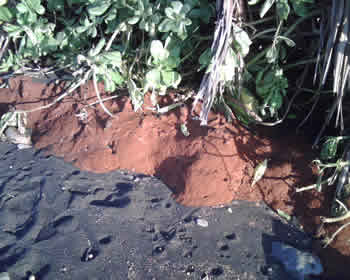 I attended a day-long workshop led by author, anthropologist and neo-shaman, Hank Wesselman. Noted for his work with the team that recently discovered the "missing link" to our primate ancestry in East Africa, he also brings a personal familiarity with Hawaiian and Polynesian traditional healing modalities.
I attended a day-long workshop led by author, anthropologist and neo-shaman, Hank Wesselman. Noted for his work with the team that recently discovered the "missing link" to our primate ancestry in East Africa, he also brings a personal familiarity with Hawaiian and Polynesian traditional healing modalities.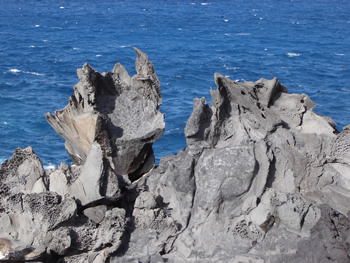 Through this course I have revamped my opinion of psychology and psychotherapy, replacing my rather outdated preconception of "analysis" which I developed as a stereotype in my youth. I felt that delving into such matters was overindulgent, that it fed the very neuroses it was purported to cure; that I was better, healthier, more intelligent than that, and could figure out for myself what were healthy ways of living and pursuing personal growth and development. I was in denial about my own dysfunctions, in thinking rather in black-and-white terms of psychological sickness/health, rather than in universal human terms concerning unhealthy patterns that all of us are prone to.
Through this course I have revamped my opinion of psychology and psychotherapy, replacing my rather outdated preconception of "analysis" which I developed as a stereotype in my youth. I felt that delving into such matters was overindulgent, that it fed the very neuroses it was purported to cure; that I was better, healthier, more intelligent than that, and could figure out for myself what were healthy ways of living and pursuing personal growth and development. I was in denial about my own dysfunctions, in thinking rather in black-and-white terms of psychological sickness/health, rather than in universal human terms concerning unhealthy patterns that all of us are prone to.  There are no fixed things or boundaries; just the appearance of them. It's all in your head! There's nothing else! It's only a dream that you create in your head! There's only energy! We are here right now! The past and the future are illusions! So get over it! You are who you are! And that is nothing other than all that is, which is also just what it is. So get on with it! Or not! It's just the dance of neurochemicals, which themselves are just vibrating molecules exchanging energy, and those molecules are composed of smaller bits which are also, all the way down the line, just composed of smaller bits exchanging energy, until you get down to the primoridial first event of pure energy deciding to split into two vibrating bits in resonant relation to each other ... forever! And the bits themselves aren't actually bits for real, they just seem to be bits when we choose to see them that way, out of the waves of energy they disappear into and appear from again.
There are no fixed things or boundaries; just the appearance of them. It's all in your head! There's nothing else! It's only a dream that you create in your head! There's only energy! We are here right now! The past and the future are illusions! So get over it! You are who you are! And that is nothing other than all that is, which is also just what it is. So get on with it! Or not! It's just the dance of neurochemicals, which themselves are just vibrating molecules exchanging energy, and those molecules are composed of smaller bits which are also, all the way down the line, just composed of smaller bits exchanging energy, until you get down to the primoridial first event of pure energy deciding to split into two vibrating bits in resonant relation to each other ... forever! And the bits themselves aren't actually bits for real, they just seem to be bits when we choose to see them that way, out of the waves of energy they disappear into and appear from again. 